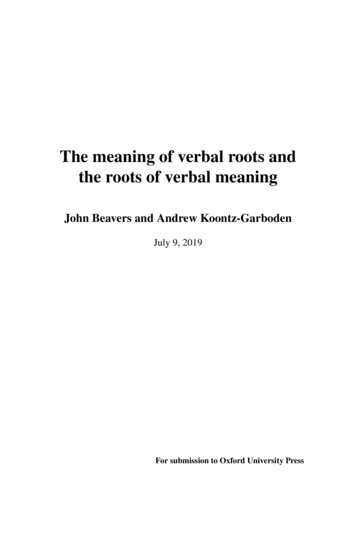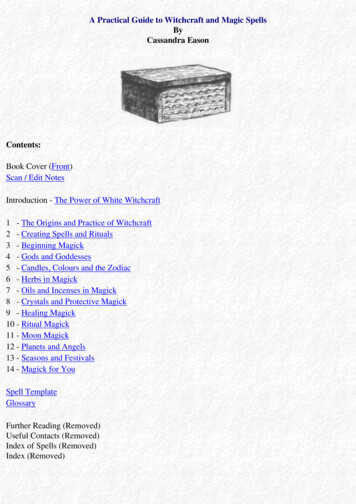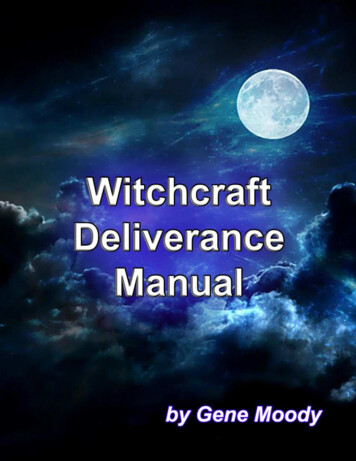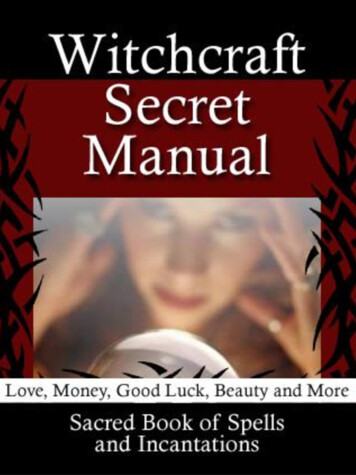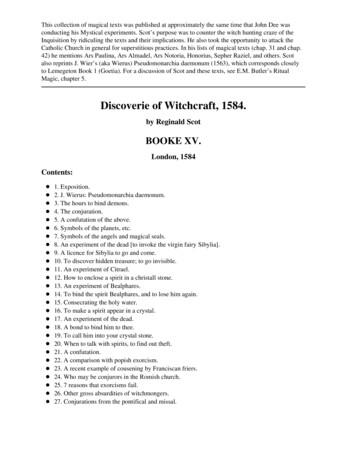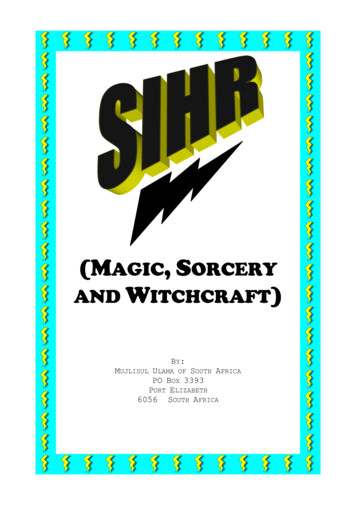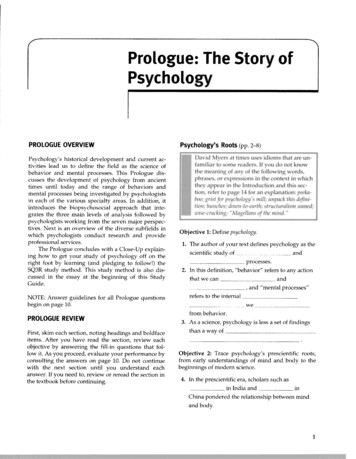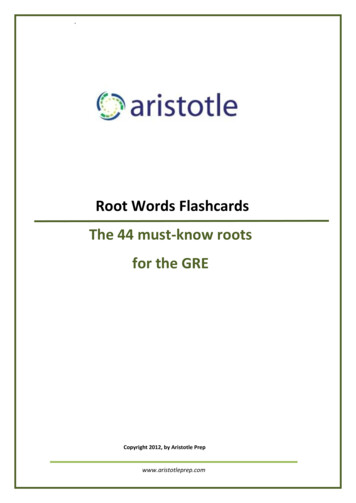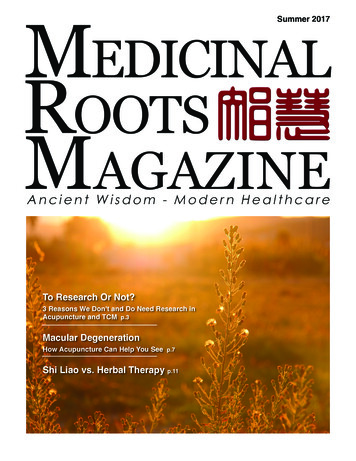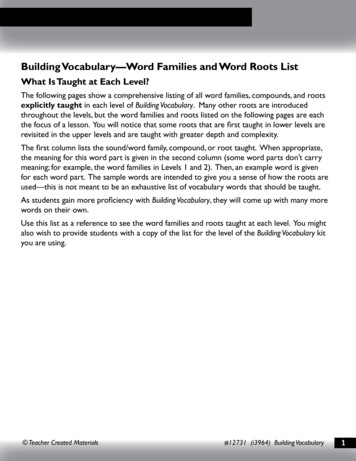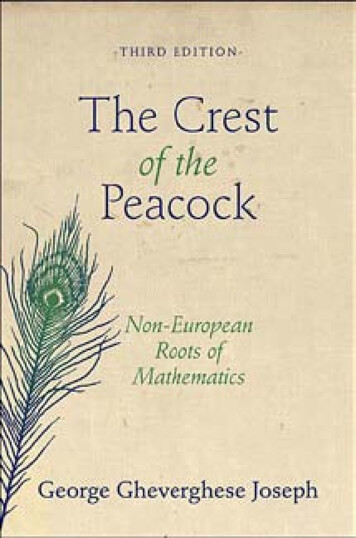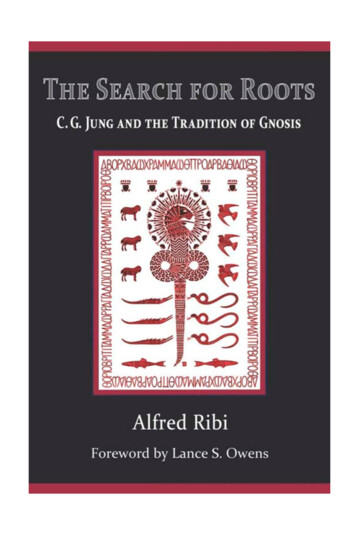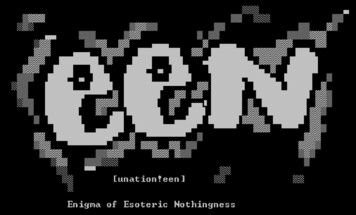
Transcription
The Roots of WitchcraftByMichael HarrisonContents:Book Cover (Front) (Back)Inside Cover BlurbQuotesIn Respectful Memory Of Margaret MurrayList of IllustrationsAcknowledgementsForeword by Colin WilsonIn The Beginning: A Sense Of Wonder .1 - The Gods of Sky and Field2 - Father God . or Mother God?3 - Fertility Religion and the Celtic Spread4 - Birthplace of an Old Religion5 - The Emergence of the Enemy6 - Rome attacks the 'Witches'7 - The Language of the Witches8 - The Historical Conclusions9 - New Blood for an Old Religion10 - The Old Faith Regenerated11 - Mopping-up OperationsBibliography (Removed)Index (Removed)
Inside Cover Blurb - The Roots of Witchcraft'It may well be asked: Why yet another book on Witchcraft? . I shall content myself with giving thethree principal reasons which persuaded me to write this book.'In the first place, I am not satisfied that any books on Witchcraft . have clearly denned Witchcraft orhave made sufficiently clear the essential distinction between Witchcraft and Diabolism. '. In thesecond place . I am concerned with the origins of the cult; more particularly with the geographicalsituation of the region from which this ancient faith spread over Europe. '. In the third place, I shallproduce evidence . to shew that, whilst Witchcraft was not, after . 1948, as widespread or aspowerful as vested ecclesiastical and political interests found it useful to make it out to be, the OldReligion . was far more established, far more widespread, until at least the year AD 1400, than theactivities of the Inquisition would imply. '. I shall point out that the modern highly-publicised"revival of Witchcraft" is a non-fact; that Witchcraft - or the Old Religion - cannot be revived until thebeliefs associated with natural . agriculture be revived. I shall further point out that, in "extirpating"the Old Religion . the Dominicans, Kramer and Sprenger, . succeeded, not only in destroying theancient, simple Fertility Cult . but also in reviving and strengthening that Diabolism which . hadbeen, for political reasons, identified with the Old Religion ."Michael Harrison
QuotesWhat Song the Syrens sang, or what Name Achilles assumed when he hid himself among Women,though puzzling Questions, are not beyond all Conjecture.HydriotaphiaI have ever believed, and do now know, that there are Witches: they that are in doubt of these . areobliquely and upon consequence a sort, not of Infidels, but Atheists.Religio Medici
In Respectful Memory Of Margaret Murrayarchaeologist, anthropologist and scholar with the creative imagination of the poet. With theintellectual detachment of genius she pioneered her lonely way against the ossified thought ofentrenched prejudice. By bringing the light of science to bear upon what was then deemed theoutworn superstitions of the vulgar and illiterate, she shewed the antiquity no less than the continuityof an ancient belief. If I have sought to follow in the path that she first opened up, I have gone themore eagerly in her footsteps because it was she who urged me to do so.SLPNil tam difficile est quin quaerendo investigari possit.
List of IllustrationsLine illustrations appearing in text'Alexamenos Worships His God!' - Contrad Research Library'Animal Magnetism' - Or Eighteenth Century Hypnotism - Author's collectionThe Dawn Of Magic - Contrad Research LibraryCybele's Castration Forceps - Contrad Research LibraryGreat Mother Of The Aegean - Author's CollectionThe 'Other People' - Contrad Research LibraryThe Horned God - Contrad Research LibraryThe Enduring Faith - Courtesy Of Routledge and Kegan PaulThe Agape: Feast Of Brotherly Love - Author's CollectionMedieval Agape - Author's CollectionThe Good Shepherd - Contrad Research LibraryThe True Vine - Contrad Research LibraryChristian Orphism - Contrad Research LibraryMore Eclectic Christianity - Author's CollectionEgyptian Masked Priest - Author's CollectionThe Witch Of Edmonton - Contrad Research Library: from Caulfield's Wonderful Museum ofRemarkable PortraitsToads As Familiars - Contrad Research LibraryWitchfinder-General - Author's Collection: from Hopkins's own work, Discovery of Witches, 1647Shiela-Na-Gig - Courtesy: Routledge And Kegan Paul LtdA Conjuration - Author's Collection: From John Ashton's The Devil In England And America, 1896Pan In The Seventeenth Century - Contrad Research LibraryThe Storm-Raisers - Contrad Research LibraryWitches And Their Imps - Contrad Research LibraryMandrakes - Male And Female - Contrad Research LibraryHanged By The Neck - Author's Collection: From Ralph Gardiner's England's Grievance DiscoveredIn Relation To The Coal Trade, 1655 Half-tone (Plate) illustrationsPlate IThe Bear-Goddess - Chinese Artemis British MuseumGreat Mother Of The Steppes - Novosti Press Agency (A.P.N.)Plate 2A Worshipper From Crete - British MuseumAn Iberian Shaman - British Museum
Plate 3The Formality Of Ritual - British MuseumThe Eleusinian Goddesses - British MuseumPlate 4The Horned God Of Ch'ang-Sha - British MuseumPlate 5Cernunnos Of The Parish - Service De Documentation Photographique, (Through Contrad ResearchLibrary)The Watcher Over Paris - Author's CollectionPlate 6The Cernunnos Of Britain - The Verulamium Museum: Author's CollectionPlate 7The Cerne Abbas Giant, Dorset - National Monuments RecordPlate 8The Folkton Drums - British Museum
AcknowledgementsOne of the few pleasures of an author's life which never lose their savour is to be found in the honestrecognition of the debt that he or she always owes to others. If no man is an island, entire of itself,then certainly no book is the work of any single mind, entire of itself. We not only need the help ofothers; it is right that we should have that need; and, if we are as fortunate as we could hope to be, weshall find ourselves needed as much as we need others.First and foremost - the trite phrase is unavoidable here - I have to thank the late Dr Margaret Murrayfor that inspiring encouragement to which I have alluded more than once in the book that she sowarmly urged me to write. That she died as her last letter to me was being written only adds anunusual -perhaps unique? - force to the urgings of one of the most brilliant minds that this or any otherperiod has produced.Margaret Murray was fortunate in being born into an age of brilliant women, all as eager andcompetent to exploit Woman's new 'liberation' as any of these noisier contemporary 'Liberators' who,to flatter themselves, have managed to persuade many that Woman's almost complete liberation didnot come a century ago - a fact which was proved, in the academic field alone, by such dazzlingimaginative intellects as those of Margaret Murray, Jane Harrison, Jessie Weston and Janet Bacon: toall of whom I have often acknowledged my deep indebtedness.It is the fashion, among some shallow minds, to dismiss Dr Murray's theories as - I quote one suchopinion - 'vapid balderdash'. I am not sure, but I have the uneasy feeling that the reluctance to acceptDr Murray as a pioneer in the more speculative aspects of Anthropology springs simply from a far toocommon masculine prejudice (that I, thank Heaven, do not share!) against conceding the possibilitythat any woman could contrive to pioneer in any activity, physical or mental.How may this indefensible prejudice possibly continue to exist in the age which has produced itsNightingales, its Garret Andersons, its Curies, its Meitzners, and so many other women pioneers!Fortunately, as I have mentioned in the text, Dr Murray's warm supporters far outnumbered herdetractors, and it is my hope that, in the not-so-distant future, all will agree with me that, in herliterally epoch-making book, The Witch-Cult in Western Europe, Dr Murray shewed, for the firsttime, the true relationship of Western Witchcraft to that Primaeval Faith which sprang from Man'sfirst important use of his differentiating and segregating mental superiority.That first important use of his mind was demonstrated when he asked those three questions which lieat the beginning of all intellectual enquiry; which are, indeed, the origin of all intellectual enquiry:'Who am I?', 'Who made me?' and 'Why am I here?'In this book, encouraged by many a dead and living writer, I have endeavoured to state the conditionsin which these essential questions were first asked - and (to a much larger extent than many think)were answered.The several sources that I have used have been acknowledged both in the body of the text and in the
Bibliography at the end of this book. Such acknowledgement is not only the courteous and justadmission of a debt to others, it serves, also, as a useful guide to further reading on the subject.However, there are two writers on Witchcraft whom (with their respective publishers) I wish speciallyto thank for permission to quote from their books: the late Mr Pennethorne Hughes and MessrsLongman, for permission to quote from Witchcraft; and (the Executors of) the late Mr T.C.Lethbridge and Messrs Routledge & Kegan Paul, for permission to quote from Witches: Investigatingan Ancient Religion.I must also acknowledge my deep debt to two other books, both of which treat of the FertilityReligion only incidentally: the late Sir F.M. Stenton's Anglo-Saxon England, my opinion of which issufficiently indicated, I trust, by the frequency and length of my references to it in my book; and once again! -Professor L.R. Palmer's The Latin Language, the one indispensable handbook, in myopinion, to any writer whose work involves the subject of Dr Palmer's matchless book. Anglo-SaxonEngland is published by The Clarendon Press, Oxford; The Latin Language by Messrs Faber & Faber.To all authors (or their Executors) and their publishers, for permission to quote from the worksmentioned above, my sincere fraternal thanks!If no book, to go back to what I said at the beginning of this Note, may ever be entirely original;entirely the work of one single author; it must yet, to justify its writing and publication, contain atleast one original contribution, by the author, to the history of, or the thinking upon, the subject ofwhich the book treats.In this book, my claim to originality lies in my having identified the language in which the Westernform of the ancient and universal Fertility Cult first achieved sophisticated expression; and whichlanguage, over the millennia, 'fossilised' into a ritual and no-longer-comprehended speech, as hashappened to the pre-Dravidian 'Elephant Language' of the Indian mahout; to the Sumerian of theSemitic rituals of Akkad; to the proto-Latin of the Carmen Arvale; and (so far as the general run ofworshippers is concerned) to the Latin of the Roman, and to the Old Slavonic of the RussianOrthodox, Church. The identification, as well as the theories based upon that identification, are mine,and I take full responsibility for them.
Foreword - By Colin WilsonIt was in Hastings, in the Summer of 1965, that I first made the acquaintance of the work of MichaelHarrison. It was at the end of a heavy week of journalistic and lecture assignments, and I still had togive a lecture and seminar on existentialism to a class of foreign students. I was beginning to feel tiredand sorry for myself. Long periods away from home always produce this effect; I begin to suffer from'people poisoning', and even places oppress me. I long to be back home, sitting in front of the fire witha book. In this mood, I make straight for the nearest second-hand bookshop. In Hastings I was lucky;I've found many long-sought volumes in the Howes Bookshop, near the seafront. It was there that Ifound a book with the promising title of London by Gaslight, a history of the Victorian and Edwardianeras, from 1861 to 1911. I have the book by me now as I write, and it still falls open at page 133, anaccount of the strange series of occurrences known as 'the Vanishings' that occurred in 1881, sevenyears before the Jack the Ripper murders. This is the paragraph on which my eye lighted:'The strange aspect of the disappearances, which were mostly centred about the London districts ofEast Ham and West Ham, was the absence of what we may call an "age pattern". Young girls, youngboys, middle-aged men and elderly women - all appeared to be equally acceptable to whoever - orwhatever - was whipping the victims away ."I can think of no paragraph better designed to make the casual browser read on. I did - throughout theweekend and my journey back to Cornwall.Incidentally, I have never been able to find any more on the Vanishings, although I have looked andenquired fairly hard.My old friend Harold Visiak, who was alive at the time of the Vanishings, told me that there was anaccount of them in Charles Fort; but I've never been able to find it. Apart from this, there is only (asfar as I know), a chapter in a book by Elliott O'Donnell called, I think, Strange Disappearances,There were nine vanishings in nine years; one might suspect Jack the Ripper, except that in the fewcases where the victim's body was recovered (one in an empty house, one at the foot of cliffs atRamsgate) there were certainly no characteristic Ripper mutilations; in fact, the body at the foot of thecliff bore no sign of injury, and the autopsy revealed no cause of death. Modern Flying Saucerenthusiasts will see all the signs of Aliens from outer space .What fascinated me about Michael Harrison was his cast of mind - the combination of scholar,antiquary, eccentric and detective; there is a certain resemblance to Charles Fort, except that Fort ishard to read, and Michael Harrison is incapable of being unreadable. I saw at once that MichaelHarrison is a member of an increasingly rare breed: the genuinely dedicated writer.In case that sounds like the conventional compliment of a writer of Introductions, let me elaborate. Inthe past, the distinction between real writers and commercial hacks was more interesting than today.Montaigne certainly qualifi
The Roots of Witchcraft By Michael Harrison Contents: Book Cover (Front) (Back) Inside Cover Blurb Quotes In Respectful Memory Of Margaret Murray List of Illustrations Acknowledgements Foreword by Colin Wilson In The Beginning: A Sense Of Wonder . 1 - The Gods of Sky and Field 2 - Father God . or Mother God? 3 - Fertility Religion and the Celtic Spread 4 - Birthplace of an Old Religion 5 .
